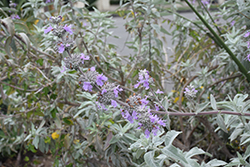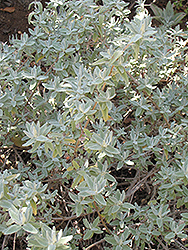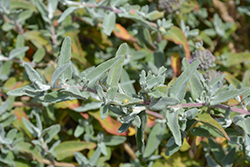It's all about ...
plants

Point Sal Spreader Sage
Salvia leucophylla 'Point Sal Spreader'
Plant Height: 24 inches
Flower Height: 3 feet
Spread: 8 feet
Sunlight:
![]()
![]()
Hardiness Zone: (annual)
Other Names: Creeping Sage, Spreading Purple Sage
Description:
An attractive low growing variety with a wide, spreading habit, producing striking spikes of rose-pink flowers; excellent as groundcover on slopes; may climb over other plants or objects
Ornamental Features
Point Sal Spreader Sage has masses of beautiful spikes of fragrant rose tubular flowers with pink overtones rising above the foliage from mid spring to mid summer, which are most effective when planted in groupings. The flowers are excellent for cutting. Its tomentose narrow leaves emerge silver in spring, turning grayish green in colour the rest of the year.
Landscape Attributes
Point Sal Spreader Sage is a multi-stemmed annual with a ground-hugging habit of growth. Its medium texture blends into the garden, but can always be balanced by a couple of finer or coarser plants for an effective composition.
This is a relatively low maintenance plant. Trim off the flower heads after they fade and die to encourage more blooms late into the season. It is a good choice for attracting bees, butterflies and hummingbirds to your yard, but is not particularly attractive to deer who tend to leave it alone in favor of tastier treats. It has no significant negative characteristics.
Point Sal Spreader Sage is recommended for the following landscape applications;
- Mass Planting
- Border Edging
- General Garden Use
- Groundcover
- Container Planting
Planting & Growing
Point Sal Spreader Sage will grow to be about 24 inches tall at maturity extending to 3 feet tall with the flowers, with a spread of 8 feet. Although it's not a true annual, this slow-growing plant can be expected to behave as an annual in our climate if left outdoors over the winter, usually needing replacement the following year. As such, gardeners should take into consideration that it will perform differently than it would in its native habitat.
This plant does best in full sun to partial shade. It is very adaptable to both dry and moist growing conditions, but will not tolerate any standing water. It is considered to be drought-tolerant, and thus makes an ideal choice for a low-water garden or xeriscape application. It is not particular as to soil pH, but grows best in rich soils, and is able to handle environmental salt. It is somewhat tolerant of urban pollution. Consider applying a thick mulch around the root zone in winter to protect it in exposed locations or colder microclimates. This is a selection of a native North American species. It can be propagated by division; however, as a cultivated variety, be aware that it may be subject to certain restrictions or prohibitions on propagation.
Point Sal Spreader Sage is a fine choice for the garden, but it is also a good selection for planting in outdoor pots and containers. Because of its spreading habit of growth, it is ideally suited for use as a 'spiller' in the 'spiller-thriller-filler' container combination; plant it near the edges where it can spill gracefully over the pot. It is even sizeable enough that it can be grown alone in a suitable container. Note that when growing plants in outdoor containers and baskets, they may require more frequent waterings than they would in the yard or garden.


